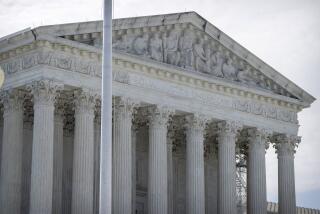Supreme Court sounds wary of Idaho’s ban on emergency abortions for women whose health is in danger

WASHINGTON — The Supreme Court justices voiced doubt Wednesday about a strict Idaho law that would make it a crime for doctors to perform an abortion even for a woman who arrives at a hospital suffering from a serious, but not life-threatening, medical emergency.
Solicitor Gen. Elizabeth Prelogar, representing the Biden administration, said such cases are rare and tragic. They are not elective abortions, she said, but pregnancies that have turned into medical emergencies.
Prelogar urged the high court to rule that federal emergency care law applies nationwide and sometimes requires hospitals and their doctors to perform an abortion — regardless of any state restrictions on the procedure — if a pregnant patient’s health or life is at risk.
The justices sounded closely split, but Prelogar’s argument appeared to gain traction with some conservatives.
The clash over emergency rooms is the first direct challenge to a state’s abortion law to come before the high court since the justices overturned Roe vs. Wade in a 5-4 vote in 2022.
The court’s conservatives said then that states and their lawmakers were free to restrict or regulate abortion.
Idaho’s lawmakers voted to forbid abortion except when it is “necessary” to prevent the patient’s death. In court, their lawyers argued that the authority to regulate doctors and the practice of medicine rests with the state.

But the Biden administration sued Idaho and said it was violating the federal Emergency Medical Treatment and Labor Act that Congress adopted in 1986. The law requires hospitals receiving federal funds to provide “necessary stabilizing treatment” to patients who face a medical emergency.
“For some pregnant women suffering tragic emergency complications, the only care that can prevent grave harm to their health is termination of the pregnancy,” the administration’s attorney said. In such situations, delay is dangerous, Prelogar added.
Idaho’s attorney, Joshua Turner, ran into sharp questions from several conservatives.
Justice Amy Coney Barrett questioned whether Idaho would use its laws to prosecute doctors who perform emergency room abortions. Chief Justice John G. Roberts Jr. and Justice Brett M. Kavanaugh also voiced doubt about the state’s argument.
Barrett cast a key vote to strike down Roe vs. Wade, but took on the Idaho attorney Wednesday for refusing to say whether doctors could perform abortions in certain emergencies.
Justice Sonia Sotomayor cited real cases from Florida and elsewhere, but Turner refused to give a yes-or-no answer as to whether such abortions would be legal in Idaho.
“Counsel, I’m kind of shocked actually because I thought your own expert has said these kinds of cases were covered,” Barrett said.
“This is a subjective standard. ... It’s very case-by-case,” Turner replied.
The exchange highlighted the problem cited by emergency room doctors in Idaho. They cannot know for sure whether an abortion would be legal under the state’s law.
What happens if the state’s lawyers believe a doctor’s intervention was not justified? “Would they be prosecuted under Idaho’s law?” Barrett asked.
Even if other doctors support the decision, “what if the prosecutor thought differently?” she said.
Roberts pressed the same point. “What happens if a dispute arises with respect to whether or not the doctor was within the confines of the Idaho law or wasn’t? Is the doctor subjected to review by a medical authority?”
Possibly, according to the state attorney. “The Board of Medicine has licensing oversight over a doctor,” Turner replied.
Kavanaugh said he was uncertain what was at stake because the state had changed its view over what emergency conditions could justify an abortion.
Justice Elena Kagan said the law has resulted in six pregnant women being airlifted to neighboring states to obtain abortions.
Justices Sotomayor and Ketanji Brown Jackson were also sharply skeptical of Idaho’s argument.
Prelogar, the Biden administration’s attorney, assured the conservative justices that federal law includes “conscience protections” for doctors and hospitals morally opposed to abortion.
The case of Moyle vs. United States poses a clash between the federal law that requires hospitals to provide emergency care and the state’s authority to regulate doctors and the practice of medicine.
Regardless of how the court rules in the Idaho case, the outcome should have no direct effect in California or other states where abortion remains legal.

Turner said 22 states now prohibit most abortions, and the court’s ruling could apply to all of them.
But Prelogar said Idaho is among only six states that make no exceptions for protecting the health of a pregnant patient.
Doctors in Idaho contend that the law endangers patients. In medical emergencies, “delay puts the patient’s life and health at risk. But the lack of clarity in the law is creating fear in our physicians,” said Dr. Jim Souza, chief physician executive for St. Luke’s Health System in Boise.
He said doctors in emergency rooms often see pregnant women whose water has broken, or who have a severe infection or are bleeding badly. An abortion may be called for in such a situation, but doctors know they could be subject to criminal prosecution if they act too soon, he said.
“Doctors are leaving the state because of the fear surrounding this law,” Souza said in an interview.
More to Read
Get the L.A. Times Politics newsletter
Deeply reported insights into legislation, politics and policy from Sacramento, Washington and beyond. In your inbox three times per week.
You may occasionally receive promotional content from the Los Angeles Times.











